ABS, research center in steelmaking
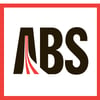 ABS Metallurgical Center (ACM) is the research center for Acciaierie Bertoli Safau (ABS), the steel division of Danieli SpA, an industrial group and a world leader in the construction of steel plants. The ACM center based in Metz France, proposes various up to date characterization approaches for covering all of the issues faced, from developing metal materials to manufacturing mechanical components. As the in-house lab belonging to an Italian steelmaker, ACM has a perfect knowledge of industrial constraints and demands. This allows ACM to make available its expertise and characterization, test and simulation resources available to its customers.
ABS Metallurgical Center (ACM) is the research center for Acciaierie Bertoli Safau (ABS), the steel division of Danieli SpA, an industrial group and a world leader in the construction of steel plants. The ACM center based in Metz France, proposes various up to date characterization approaches for covering all of the issues faced, from developing metal materials to manufacturing mechanical components. As the in-house lab belonging to an Italian steelmaker, ACM has a perfect knowledge of industrial constraints and demands. This allows ACM to make available its expertise and characterization, test and simulation resources available to its customers.
Challenge: Setting up a study revamping a vertical-curve machine to include soft reduction
In collaboration with Danieli, ACM conducted a study on revamping a continuous casting machine to include soft reduction.
Based on numerical simulations produced with THERCAST® software, the aim was to predict the effects of soft reduction on the finished product and to better understand the physical phenomena caused.
To fully meet the customer’s expectations, the study needed to validate the continuous casting machine design, anticipate on any defects that may appear and enhance the reliability of the installations.
With support from Transvalor, ACM’s teams were also to determine the best numerical approach for this kind of configuration, to find an effective compromise between result accuracy and calculation time.
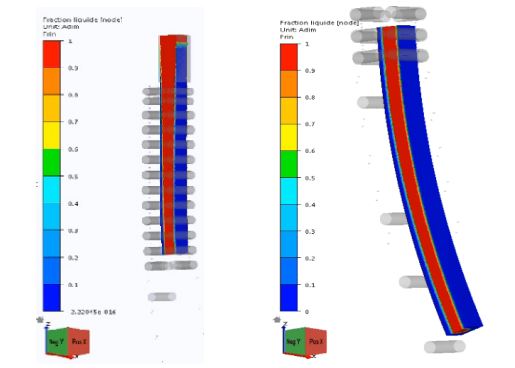 Method for the thermomechanical simulation of the process
Method for the thermomechanical simulation of the process
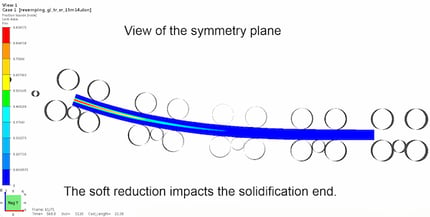
Evolution of the liquid fraction during the product straightening
Solution: set up a study revamping a vertical-curve machine
An initial thermal calculation is used to determine the area to apply soft reduction in line with the change in core temperature and solid fraction.
The aim is to perform an overall thermomechanics calculation on the entire casting machine to observe the impact of soft reduction on the product core. A so-called “overall slice based” calculation method was cleverly developed to simulate the entire machine (~25m) with calculation times considerably reduced in relation to a conventional approach (-50%) without compromising the quality of results.
The THERCAST® calculation shows how the liquid fraction evolves and the impact of soft reduction on the finished position of the liquid well and on the solidified thickness. The thermomechanics approach allows calculating deformation and the stresses generated in the cast product with a view to preventing hot tearing phenomena. Numerical simulation becomes a unique advantage when it comes to validating the casting machine design.
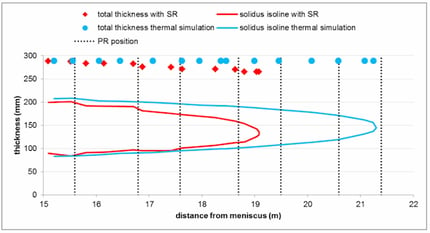
Evolution of the thickness of the solidified shell: effect of the soft reduction
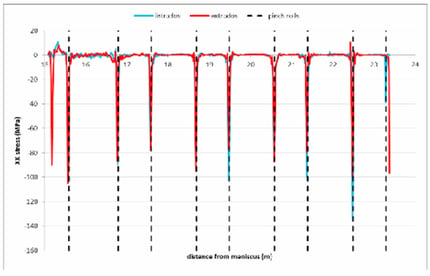
Evolution of XX stresses in the center of the billet surface
Benefits: control the internal health of products and anticipate the soft reduction impact
- Precisely determining the impact of soft reduction on the position of the solidification well
- Predicting how the solidified thickness will evolve throughout casting.
- Quantifying the mechanical deformations and stresses applied to the cast product.
- dentifying those areas where there are porousness risks.
- Detecting the appearance of hot cracking thanks to damage criteria.
- An optimized calculation method for halving calculation times.
- Significantly reducing the need for full scale tests.




